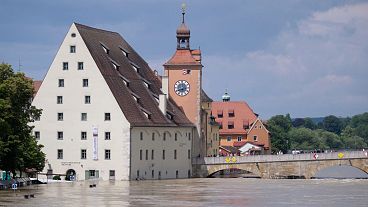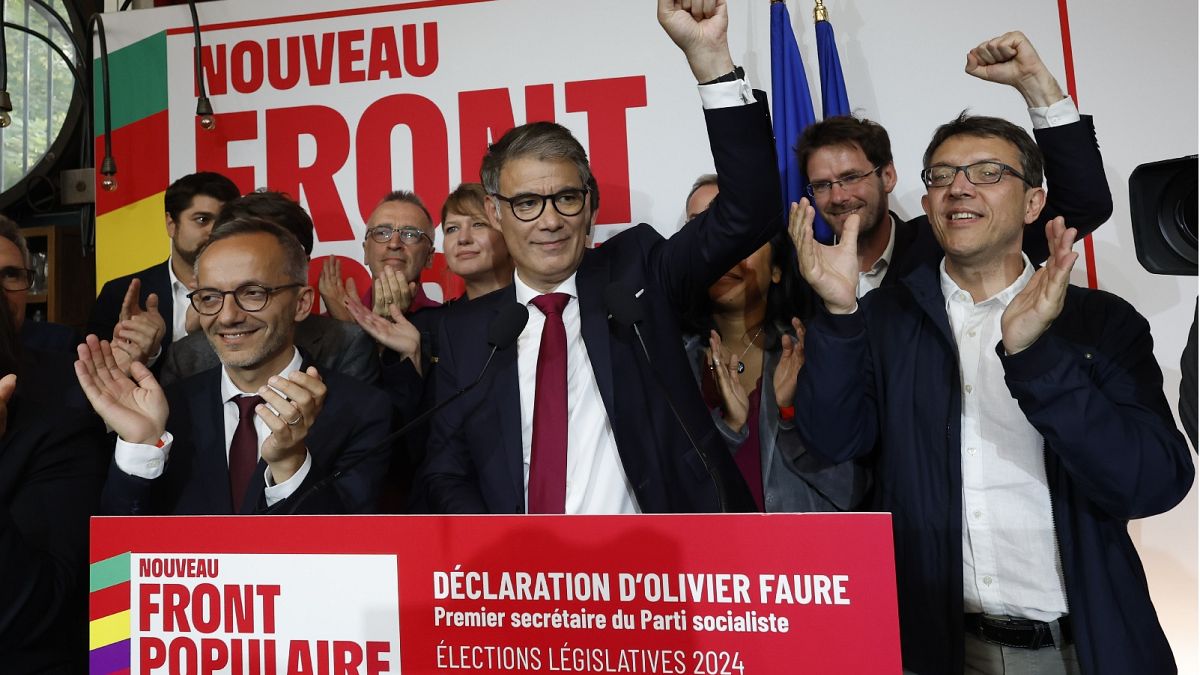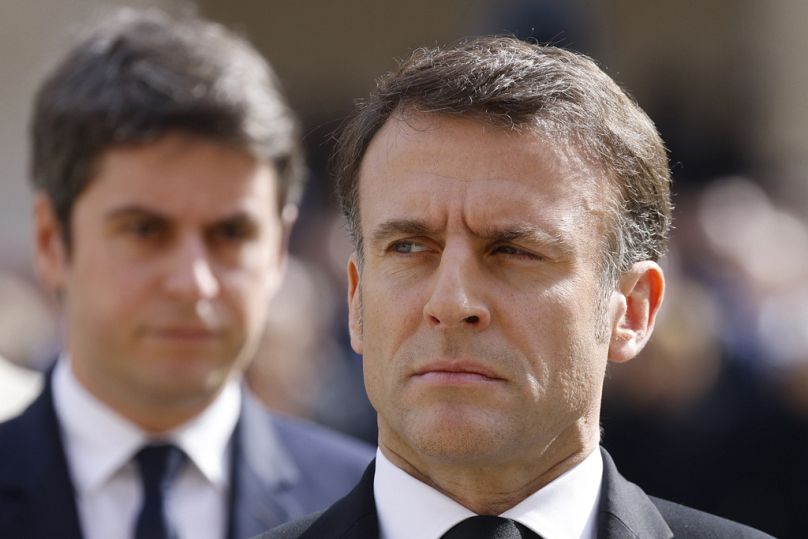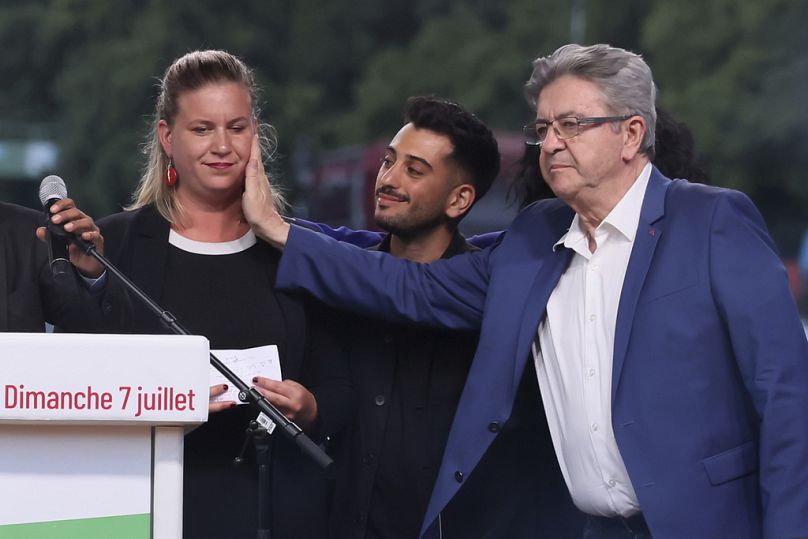The New Popular Front won the most seats in France's snap legislative elections but fell far short of an absolute majority.
Parties making up the left-wing New Popular Front (NFP), which created the surprise by topping France’s snap legislatures elections, claimed they have the right to govern and vowed to constrain the far-right as they returned to the National Assembly on Thursday.
“We are, from today, on the job. We are on the job with our partners in the New Popular Front, we are on the job with the France Unbowed group, and we still claim to govern this country,” Mathilde Panot, the parliamentary leader for the hard-left France Unbowed (LFI) party told reporters upon arriving at the National Assembly.
“[French President] Emmanuel Macron must bow to the choice of the ballot box,” she added.
The NFP, which was created within 48 hours of Macron announcing the dissolution of parliament on 9 June, is composed of various leftist parties, including the LFI and the Communist party, as well as more moderate forces like the Socialists and the Greens.
Together, they defied pollsters' expectations and scuppered the far-right National Rally's (RN) bid to win the snap ballot and claim a stake in the next government.
The NFP secured as many as 193 seats, ahead of Macron’s centrist Ensemble coalition, which itself surprised by coming in second with 164 seats, and the RN and its allies, who walked away with 143 seats.
None of them, however, won the 289 seats needed to secure an absolute majority and therefore the right to govern alone.
But the NFP seems to believe it could.
Macron 'must respect the choice of voters'
Communist leader Fabien Roussel said in an interview published in the regional daily newspaper Midi Libre on Tuesday that "we are asking the President of the Republic (...) to let us govern”, affirming that the NFP “are the most numerous, ready to sit and work with the programme presented to the electorate.”
Such a scenario would imply a “cohabitation,” under which the president hails from a party different than their prime minister and cabinet, is possible. France has had three such cohabitations before, but each time they followed legislative elections that delivered a clear mandate and sizeable majority to a single political current, which is not the case today.
The NFP could also try to govern with a relative majority, but this has its limits, as Macron can attest.
The president lost his absolute majority two years ago by retaining just 246 MPs weeks after being reelected to the top job.
His calls for the various factions to compromise mostly fell on deaf ears, with his government pushing through reforms by using the controversial 49.3 article of the constitution that allows it to bypass a vote but leaves it open to a no-confidence vote.
It survived these no-confidence votes because the various opposition parties could not agree on a joint platform. The margin was also smaller: Macron’s coalition was 43 seats shy of an absolute majority, whereas the NFP is now about 96 seats short.
In his interview, Roussel nonetheless argued that it could work if Ensemble MPs "respect the choice of the voters who put us in the lead."
"If the Macronist MPs do not vote for the motions of censure, our government will be able to govern," he said.
The NFP has pledged to repeal Macron's abrogation of the wealth tax and the pension reform passed last year that pushed the retirement age back by two years to 64, among other measures.
'Only answer is a broad coalition'
Clément Beaune, a close Macron ally who lost his seat in the snap election, appeared to pour cold water on the NFP's reading of the situation on Tuesday.
The former transport minister conceded on social platform X that topping the ballot gave NFP "rights". Yet, he argued that the lack of majority and the fact many MPs on the left and centre were elected "not on their programme alone" but as part of the so-called "republican front" to block the RN from getting to power did not give the victorious NFP carte blanche.*
"The only answer is a broad coalition which party leaders must start negotiating," he wrote.
Macron and his prime minister, Gabriel Attal, who tendered his resignation on Monday but has been asked to stay on as a caretaker, have signalled their willingness to enter a so-called rainbow coalition composed of "moderates".
This would exclude the LFI, which many among Macron's ranks consider just as extreme as the RN, but include the 39 dissident right-wing Republicans (LR) MPs who rejected the pre-election alliance with the RN struck by their president, Eric Ciotti.
However, Laurent Wauquiez, the president of the Auvergne-Rhone-Alpes regional council and a powerful figure in the LR party, said he would enter "no coalition and no compromise". Meanwhile, NFP leaders have, for now, said they would continue working together.
But cracks could soon appear.
NFP leaders have held hours of talks, including over the previous two nights, to coalesce together on a number of issues, including who they would like to see in government and who should ascend to the prime ministerial role, a decision that, in theory, remains Macron's alone.
Jean-Luc Mélenchon, the controversial leader of LFI, has said he would like the job, which is unlikely to go down well with the other NFP parties. Olivier Faure, the Socialist leader, has also put himself forward, telling reporters on Tuesday: "I'm ready for it".
"But in dialogue with the partners because I think that no one can impose themselves on anyone," he also said.
The socialist group was met in front of the Assembly by protesters decrying the party's alliance with the LFI. They carried signs reading "anti-semitism is not a social project" and chanting "Republican Front, don't compromise yourself. We don't want antisemites", in reference to Mélenchon, who has been accused of downplaying antisemitism.
'We are on borrowed time'
One thing the various NFP parties do seem to agree on for now is the need to block the RN from taking on leadership roles in the National Assembly.
"We are on borrowed time from the extreme right, either we succeed and in that case we will perhaps ward off the threat of the extreme right for a long time, or we fail and then we run the risk of seeing them unfortunately arrive this time with an absolute majority," Faure said.
The far-right party has the largest single delegation in parliament - NFP and Ensemble are coalitions of parties - which has led some to argue one of their MPs should get the role of president or speaker of the assembly.
Panot and Cyrielle Chatelain, one of two co-presidents of the Green group in the Assembly, refuted that on Tuesday.
It was voters, Chatelain told reporters as her 33 member-strong group prepared to enter parliament for the first time, who "have blocked (the RN) at the ballot box, so it's our responsibility to block it in the National Assembly."
"The extreme right is not compatible with the republic, so the RN must not occupy any leadership position in this Assembly, that's the mandate given to us by the electorate," she added.














